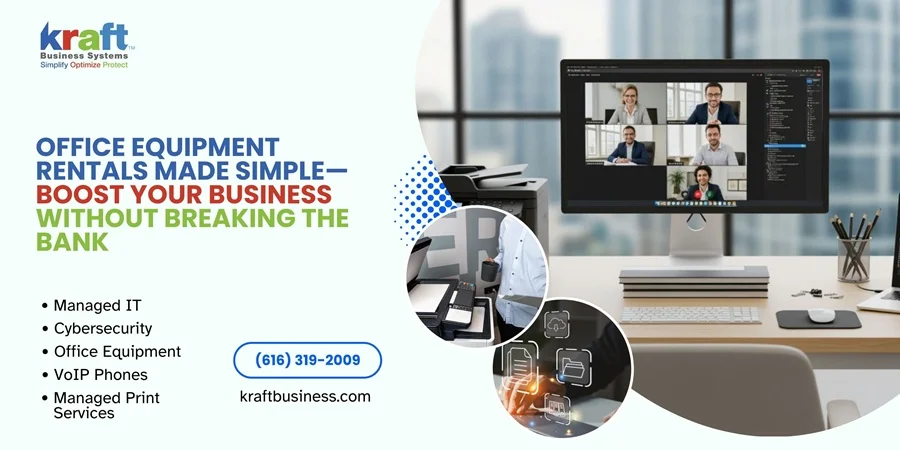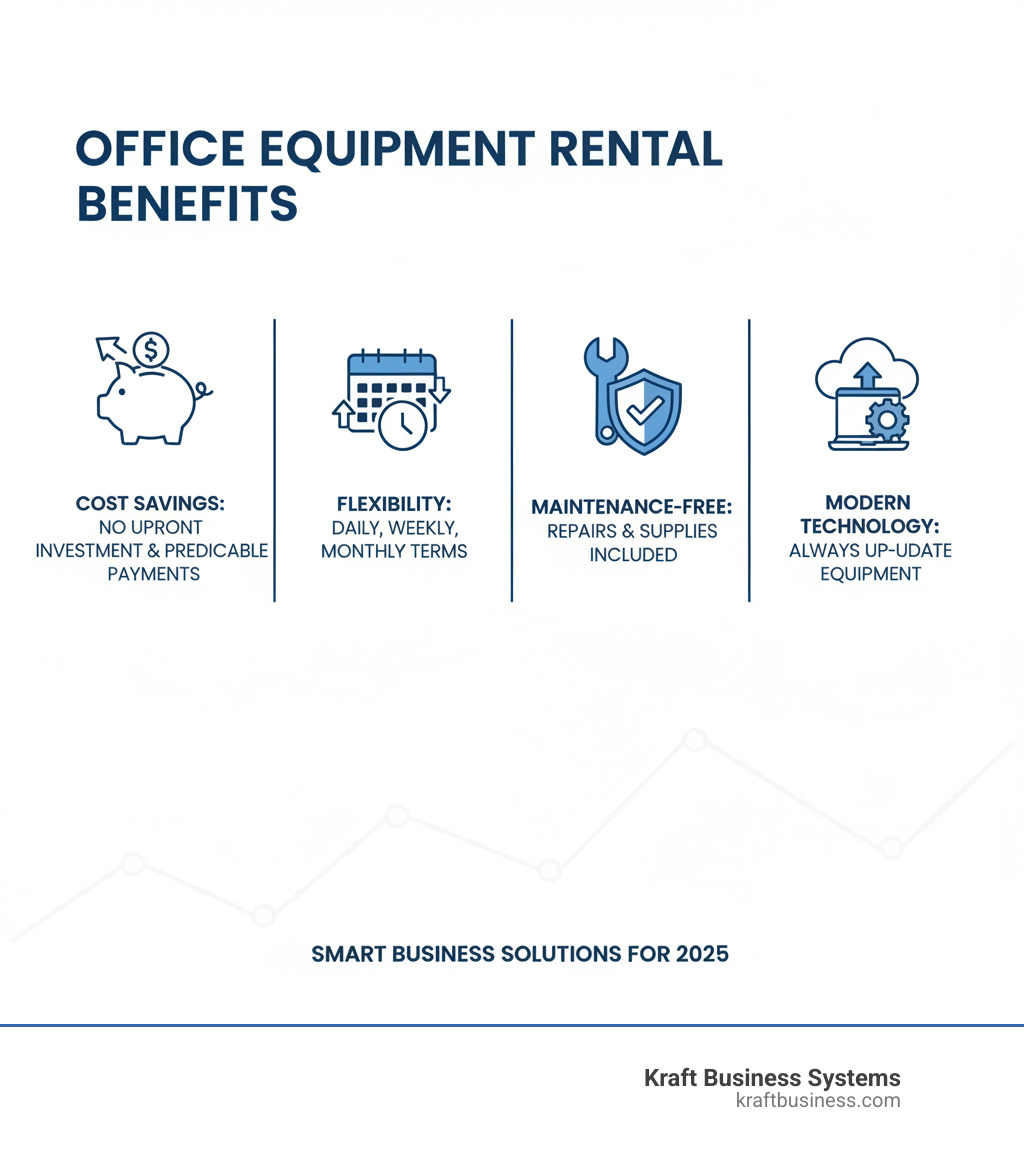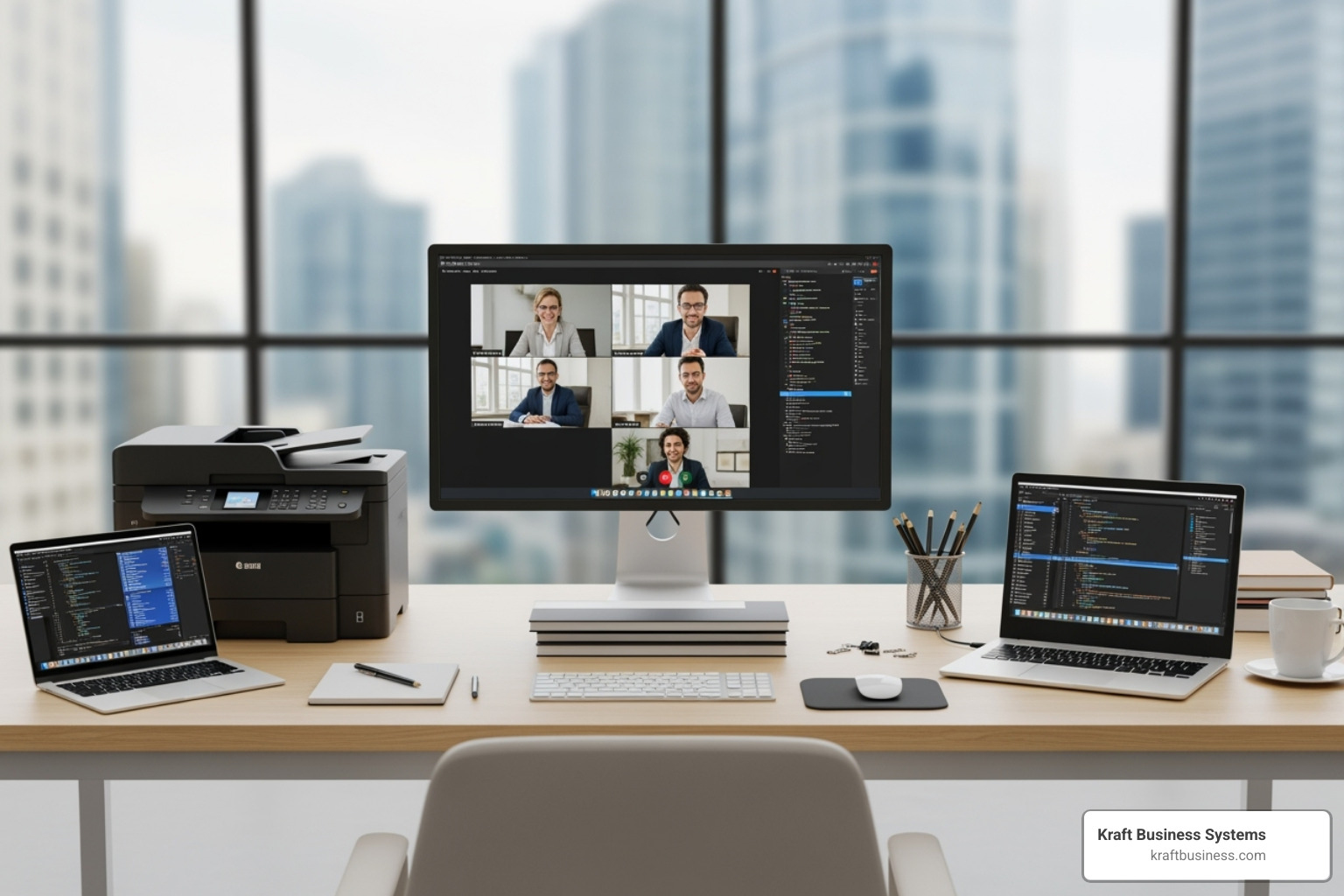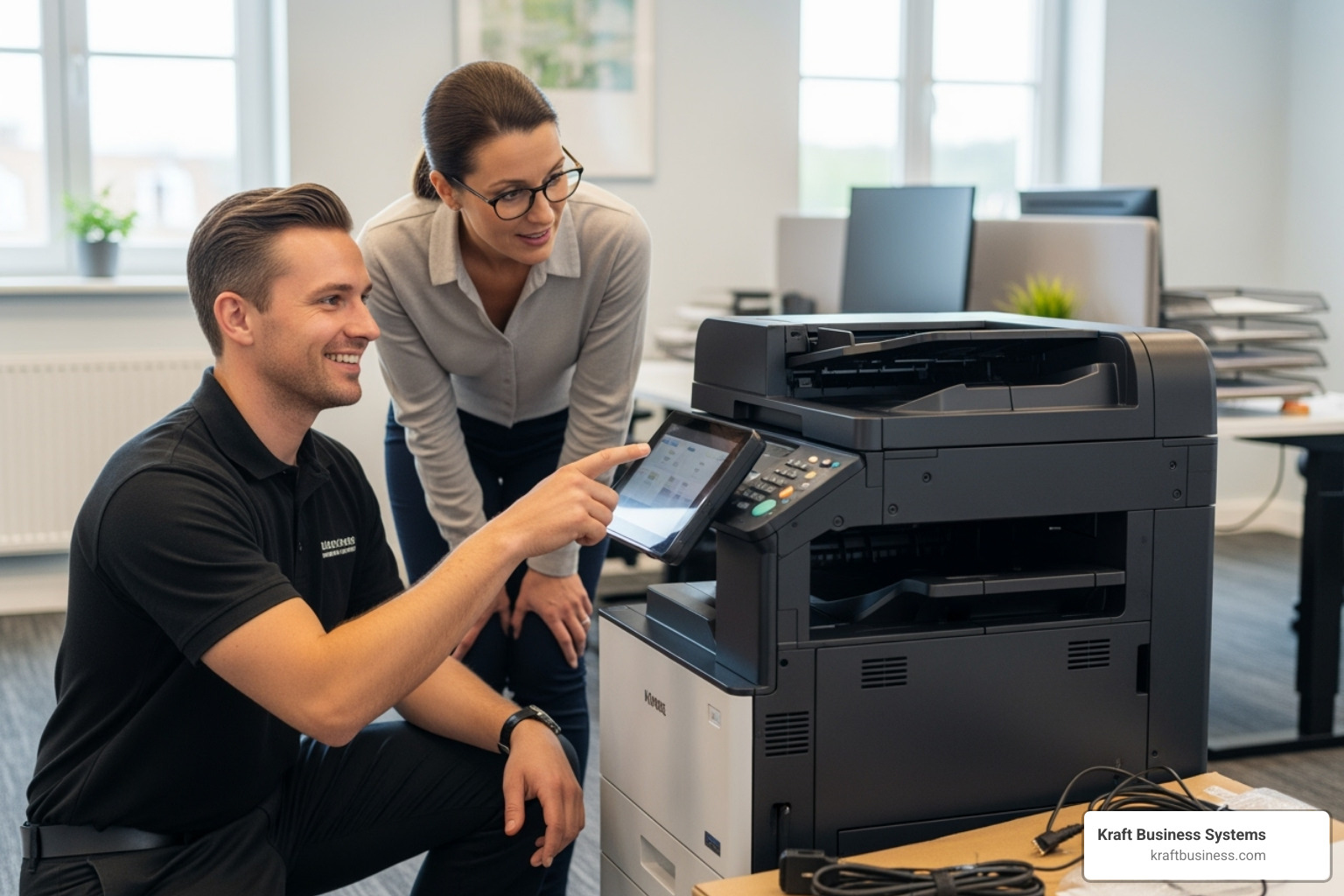AI Overview:
This article provides a deep dive into how office equipment rental services are reshaping business operations by offering flexibility, cost efficiency, and access to modern technology—without the financial burden of ownership. It examines the financial, operational, and strategic benefits of renting versus buying and provides practical guidance on selecting the right provider.
Office equipment rental service 2025: Maximize Savings
Why Office Equipment Rental Services Are Changing How Businesses Operate
An office equipment rental service provides businesses access to essential technology like printers, copiers, laptops, and AV equipment without the massive upfront investment of purchasing. Here’s what you need to know:
Key Benefits:
- No large capital expenditure – Preserve cash flow for core business operations
- All-inclusive service – Maintenance, repairs, and supplies typically included
- Flexible terms – Daily, weekly, or monthly rentals available
- Access to latest technology – Upgrade equipment without ownership commitment
- Tax advantages – Rental payments often fully deductible as operational expenses
The global office equipment rental market has grown to $10.5 billion in 2022 and is projected to reach USD 17.8 billion by 2030. This explosive growth reflects a fundamental shift in how smart businesses approach their technology needs.
Gone are the days when purchasing was the only viable option. Today’s rental services offer everything from short-term event solutions to long-term business partnerships, complete with delivery, installation, maintenance, and support.
Whether you’re planning a conference, setting up a temporary office, or simply want to avoid tying up capital in depreciating assets, rental services provide the flexibility modern businesses demand. Companies can now focus their resources on growth rather than equipment ownership.
Why Rent? The Financial and Operational Edge of Renting vs. Buying
Running a business means making countless decisions about where to spend your hard-earned money. When it comes to office equipment, there’s a fundamental shift happening in how smart business owners approach their technology needs. The old-school mentality of “buy it and own it” is giving way to something much more strategic: office equipment rental services.
Here’s the thing about buying equipment outright: it’s what accountants call a Capital Expenditure (CapEx). That means you’re dropping a big chunk of cash upfront, and that expensive printer or copier becomes an asset on your books that loses value every single day. Not exactly exciting, right?
Renting flips this whole scenario on its head by turning that expense into an Operational Expenditure (OpEx). Instead of one massive payment that makes your accountant wince, you get predictable monthly payments that fit neatly into your operating budget. This isn’t just about moving numbers around on a spreadsheet – it’s about cash flow management that actually makes sense.
Think about it: that money you didn’t spend on a fleet of printers? You can invest it back into your business, hire that new team member you’ve been wanting, or finally launch that marketing campaign. For growing businesses especially, this flexibility can be the difference between thriving and just surviving.
And let’s be honest about technology – it moves fast. Really fast. The top-of-the-line printer you buy today might feel outdated in two years. With rental services, you’re not stuck with depreciating equipment. You get access to the latest technology without the commitment, which means your team always has the best tools to do their job.
Key Financial Benefits
The numbers don’t lie when it comes to the financial advantages of an office equipment rental service. The most obvious benefit? No high upfront investment. Instead of writing a check for thousands of dollars, you get to keep that capital in your business where it belongs.
Those predictable monthly payments are a budget manager’s dream. You know exactly what you’ll pay each month, making it infinitely easier to forecast expenses and plan for growth. No surprise repair bills, no emergency equipment purchases – just clean, simple budgeting.
Here’s where it gets really interesting from a tax perspective. Rental payments typically qualify as business expense deductions that you can write off in the same year you pay them. Compare that to purchased equipment, which you have to depreciate over several years, and the tax advantages become clear. Your rental payments convert from CapEx to OpEx, which often means more immediate tax benefits and better financial ratios on your books. (Always check with your tax professional about your specific situation, and you can find more details in the IRS publications on business expense deductions.)
All of this adds up to improved operational efficiency. When you’re not tying up capital in equipment or worrying about maintenance costs, you can focus on what really matters: growing your business and serving your customers.
All-Inclusive Service and Support
Here’s where renting really shines: imagine never having to worry about your office equipment again. No “out of order” signs taped to broken printers, no frantic searches for the right toner cartridge, no IT headaches when something goes wrong.
Most office equipment rental services include maintenance and repair services as part of the deal. When something breaks, you don’t pull out your credit card – you pick up the phone. The rental company handles everything from routine maintenance to major repairs, often with on-site support from trained technicians who know your equipment inside and out.
The convenience extends to supplies too. Need toner and supplies? They’re typically included in your rental agreement. No more last-minute office supply runs or keeping track of inventory. Your provider makes sure you have what you need, when you need it.
Delivery and setup are standard too. Whether you’re setting up for a big conference or integrating new equipment into your daily operations, the rental service handles the heavy lifting. They’ll deliver, install, configure, and even train your team on how to use everything properly.
This comprehensive support means your internal IT team can focus on strategic projects instead of troubleshooting printer jams. It’s like having a dedicated equipment manager without adding to your payroll. For businesses looking to streamline their technology management even further, you can explore additional IT solutions that complement your equipment rental strategy.
What Can You Rent? A Look at Common Equipment and Rental Terms
The world of office equipment rental services is far more expansive than most business owners realize. Whether you’re launching a startup from a temporary space, organizing a major conference, or simply need to handle an unexpected surge in document processing, rental services can meet virtually any business challenge you throw at them.
The beauty of renting lies in its ability to adapt to your specific situation. Maybe you’re setting up a pop-up office for a three-month project, or perhaps you need to equip an entire conference room for a single high-stakes presentation. Whatever your needs, there’s likely a rental solution that fits perfectly.
Common Types of Rental Equipment
Printers and copiers remain the backbone of most rental agreements, and for good reason. These workhorses handle everything from basic document printing to high-volume production runs. Modern multifunction devices can print, copy, scan, and fax all from one compact unit. Whether you need a simple desktop printer for a small team or a production-level machine that can handle thousands of pages daily, rental services have you covered. Explore our printers and copiers to see what’s available.
Laptops and desktops offer incredible flexibility for businesses with fluctuating staffing needs. These often come pre-loaded with essential software and configured to your specifications, meaning your temporary staff can hit the ground running from day one. Both Mac and PC options are typically available.
For businesses tackling digitization projects, scanners provide the perfect solution. Whether you’re converting a few filing cabinets or an entire archive to digital format, you can rent scanners designed for low, medium, or high-volume work. Some providers even offer large-format scanners for architectural drawings or engineering plans.
AV equipment transforms any space into a professional presentation venue. This category includes everything from basic data projectors and screens to sophisticated sound systems and staging equipment. If you’re hosting a conference or trade show, these rentals can make the difference between a memorable event and a forgettable one.
The rise of hybrid work has made video conferencing systems essential for many businesses. Dedicated conferencing equipment with high-quality cameras and audio systems ensures your remote meetings run smoothly, whether you’re connecting with clients across the country or team members working from home.
Office furniture rentals offer surprising versatility. Beyond basic desks and chairs, you can rent conference tables, filing cabinets, and even specialized acoustic furniture for open offices. This is particularly valuable if you frequently rebrand or reorganize your workspace.
Don’t overlook communication equipment like IP phone systems and unified communications platforms. These provide professional-grade calling features without the need to purchase and maintain complex hardware.
Typical Rental Periods and Use Cases
The flexibility of rental periods is where office equipment rental services truly shine. Daily rentals work perfectly for single events, training sessions, or urgent document processing needs. Imagine your main printer breaks down right before a major proposal deadline – a daily rental can save the day.
Weekly rentals suit short-term projects, temporary office setups, or testing new equipment before making a purchase decision. Many businesses use weekly rentals to handle seasonal spikes in workload without committing to permanent equipment.
Monthly rentals provide the sweet spot for many businesses. They’re ideal for ongoing projects, temporary office expansions, or situations where you need equipment but aren’t ready to commit long-term. Startups often rely on monthly rentals while they figure out their permanent equipment needs.
Long-term projects might require equipment for several months or even a year. Construction companies setting up site offices, businesses undergoing major relocations, or companies managing extended special projects often find long-term rentals more cost-effective than purchasing.
Special events and conferences represent one of the most popular use cases for equipment rentals. Trade shows, corporate retreats, training seminars, and product launches all benefit from the flexibility of rental equipment. You get exactly what you need for the duration of your event, then simply return it when you’re done.
Seasonal business demands create perfect rental opportunities. Tax preparation firms might need extra printers and scanners during tax season, while retail businesses might require additional POS systems during holiday rushes. Renting allows you to scale up during busy periods and scale back down when things return to normal, keeping your overhead manageable year-round.
This adaptability ensures you always have the right tools for the job, exactly when and where you need them, without the financial burden or storage challenges of ownership.
Renting vs. Leasing: Making the Right Choice for Your Business
When we’re looking at ways to get office equipment without buying it outright, we typically face two main paths: renting and leasing. While both options help us avoid that big upfront purchase, they’re really designed for different situations and business strategies.
Think of it this way – choosing between an office equipment rental service and a leasing agreement is a bit like deciding between a hotel stay and signing an apartment lease. Both give you a place to stay, but the commitment level and flexibility are worlds apart.
Understanding these differences isn’t just about saving money (though that’s certainly important). It’s about matching our choice to how our business actually operates, grows, and adapts to change.
Core Differences to Consider
Let’s break down what really separates renting from leasing with a straightforward comparison:
| Feature | Renting an Office Equipment Service | Leasing Office Equipment |
|---|---|---|
| Contract Term | Typically short-term (daily, weekly, monthly, up to 1-2 years). | Usually longer-term (36, 48, or 60 months are common). |
| Flexibility | High. Easy to scale up/down, change equipment, or terminate. Ideal for uncertain needs. | Moderate. More commitment, but often options to upgrade or buyout at term end. |
| Monthly Cost | Generally higher monthly rate for short terms due to higher flexibility. | Lower monthly rate for longer terms, often includes maintenance. |
| End-of-Term Options | Return equipment; no ownership option. | Extend, renew, return, or purchase (buyout) at a nominal cost. |
| Equity | None built. | Can build equity if there’s a buyout option. |
| Best For | Unpredictable growth, short-term projects, events, testing new equipment, minimizing commitment. | Stable long-term needs, budget predictability, building business credit, technology refresh cycles. |
The key takeaway? Leasing often costs less month-to-month and lets us build some equity in the equipment, while renting gives us maximum flexibility – though we pay a bit more for that freedom.
It’s like paying extra for that hotel room because you might need to check out early, versus getting a better rate on the apartment because you’re promising to stay put.
When to Choose an office equipment rental service
So when does an office equipment rental service make the most sense? We’ve found it’s the smart choice in several key situations.
Unpredictable growth is probably the biggest reason to choose renting. If our business is growing fast but we’re not sure exactly where we’ll be in six months, renting gives us room to breathe. We can add equipment when we need it and send it back when we don’t, without being stuck with a three-year contract that no longer fits our reality.
Short-term projects and events are where renting really shines. Setting up for a big conference? Need extra capacity during tax season? Planning a temporary office while your main space gets renovated? Renting lets us get exactly what we need for exactly as long as we need it.
Testing new equipment is another smart use of rental services. Before we commit to a long-term relationship with a particular printer or scanner, we can rent it for a month or two to see how it actually performs in our specific environment. It’s like test-driving a car, but for office equipment.
Frequent upgrades make renting attractive too. In fast-moving industries where having the latest technology gives us a competitive edge, renting means we’re never stuck with outdated equipment. We can always swap up to the newest model without the headache of selling or disposing of the old one.
Finally, minimizing commitment appeals to businesses that value flexibility above all else. Maybe we have short-term office leases, or we’re planning significant changes to our operations. Renting keeps our options open and our obligations light.
Choosing an office equipment rental service gives us the freedom to adapt quickly, spend smart, and keep our office running with the latest technology – all without the traditional headaches that come with ownership.
Choosing the Right Office Equipment Rental Service Provider
When it comes to selecting an office equipment rental service provider, we’re not just picking a vendor – we’re choosing a partner who will directly impact our daily operations and business success. The right provider becomes an extension of our team, while the wrong one can turn simple equipment needs into ongoing headaches.
Think about it this way: when our printer breaks down during a crucial deadline, we need someone who answers the phone, understands the urgency, and has a technician on the way – not someone who puts us on hold for twenty minutes. The best providers understand that their reputation isn’t built on flashy marketing but on consistent, reliable service when we need it most.
What separates exceptional providers from the rest is their commitment to customer support and the technical expertise of their staff. When we’re evaluating potential partners, we look for companies that offer robust Service Level Agreements (SLAs) with clear response times and guaranteed support levels. These aren’t just pieces of paper – they’re promises about how quickly help will arrive when something goes wrong.
Factors That Influence Rental Costs
Understanding what drives rental costs helps us make smarter decisions and avoid surprises down the road. While every situation is unique, several key factors consistently influence pricing across the industry.
Equipment type plays the biggest role in cost determination. A basic desktop printer will naturally cost less to rent than a high-speed multifunction device that prints, copies, scans, and faxes thousands of pages per month. Specialized equipment like large-format plotters or advanced video conferencing systems command premium rates because they’re more complex and valuable.
The rental duration creates an interesting dynamic. Short-term rentals – think daily or weekly – often carry higher per-day rates because providers need to recover their costs quickly. However, longer-term arrangements typically offer better value per month, making them ideal for ongoing business needs rather than one-off events.
Volume matters too, both in terms of equipment quantity and usage. Renting multiple units often qualifies us for volume discounts, while high-volume printing agreements might include set page allowances with overage charges. The scope of included services – delivery, setup, maintenance, supplies like toner, and on-site support – significantly impacts overall costs. Full-service packages might seem pricier upfront but often prove more economical by eliminating hidden fees and unexpected expenses.
Geographic factors also come into play. Delivery location affects costs, especially for remote sites or rush deliveries. However, the peace of mind that comes with professional delivery and setup usually justifies any additional expense.
The Process of Renting Equipment
Renting office equipment should feel straightforward, not overwhelming. The best providers have streamlined their processes to make everything as smooth as possible for busy business owners.
Getting a quote starts the journey. We simply reach out with our needs – what equipment, how many units, how long we need them, and where they’re going. Quality providers respond quickly with detailed, transparent quotes that break down all costs and services.
Signing the agreement comes next, and this is where we need to pay attention. The rental contract should clearly outline maintenance responsibilities, support procedures, and end-of-term requirements. Good providers encourage questions and explain terms clearly rather than rushing us through paperwork.
Scheduling delivery happens on our timeline. Professional providers work around our schedule, whether we need equipment delivered to an empty office space before we move in or want installation during off-hours to avoid disrupting daily operations.
The magic happens during installation and configuration. Skilled technicians don’t just drop off boxes – they ensure everything works perfectly before they leave. This includes connecting devices to our network, configuring settings, and testing all functions. Many providers also offer on-site training for complex equipment, making sure our team feels confident using new devices from day one.
When the rental period ends, the return process should be just as seamless. The provider arranges pickup, handles all the logistics, and ensures we’re not left with any lingering responsibilities.
What to Look for in a Provider
Choosing the right office equipment rental service partner requires looking beyond price to evaluate the complete service experience. Several critical factors separate exceptional providers from merely adequate ones.
Service coverage matters tremendously for our business continuity. Companies with nationwide reach offer consistency across multiple locations and can handle complex deployments, while strong local providers often deliver faster response times and more personalized attention. At Kraft Business Systems, we combine the best of both approaches – broad coverage across Michigan with deep local expertise in communities from Grand Rapids and Ann Arbor to Detroit and Traverse City.
Quality control processes reveal how seriously a provider takes equipment reliability. The best companies manually inspect every device before it goes out, testing everything from basic functionality to network connectivity. This attention to detail means we receive equipment that works flawlessly from the moment it arrives.
Equipment reliability extends beyond initial quality checks. We want providers who maintain modern, well-serviced equipment from reputable manufacturers. Regular maintenance schedules and proactive replacement of aging devices minimize the risk of breakdowns during critical periods.
In today’s security-conscious environment, data protection can’t be an afterthought. Providers should have clear policies for securely wiping data from returned computers and multifunction devices. They should also ensure rented computers arrive with current software updates and security patches, protecting both performance and cybersecurity.
The best providers understand that comprehensive support means being there when we need them most. Look for companies that offer responsive customer service, clear escalation procedures, and technical staff who can solve problems quickly rather than just taking messages.
To explore how our comprehensive approach to office equipment and technology solutions can support your business needs, visit Learn more about our products.
Frequently Asked Questions about Office Equipment Rentals
When businesses consider switching to an office equipment rental service, we hear the same thoughtful questions time and again. It’s completely natural to want clarity before making this strategic shift. Let’s tackle the most common concerns we encounter, drawing from real-world experience helping businesses across Michigan make smart equipment decisions.
What services are typically included with an office equipment rental?
The beauty of a modern office equipment rental service lies in its comprehensive, worry-free approach. Think of it as having a dedicated equipment manager without adding someone to your payroll.
Most rental agreements are full-service, which means we handle the heavy lifting from start to finish. This includes delivery, professional installation, and setup – our technicians arrive at your location, integrate the equipment with your existing network, and ensure everything works perfectly before they leave.
But the real value kicks in after installation. All ongoing maintenance and repairs are covered, which eliminates those surprise service calls that can derail your budget. When something needs attention, you make one phone call, and we take care of it.
Necessary supplies like toner are typically included too, either as part of the monthly fee or through a simple per-page arrangement. No more emergency runs to the office supply store or trying to figure out which toner cartridge fits your specific model.
Finally, on-call technical support ensures that when questions arise or minor issues pop up, help is just a phone call away. This comprehensive approach minimizes downtime and keeps your team productive.
How does renting benefit a business with short-term needs like a conference or temporary project?
This is where an office equipment rental service truly shines. Whether you're hosting a three-day conference, setting up a temporary office for a construction project, or handling a seasonal business surge, renting provides exactly what you need, when you need it, without any long-term strings attached.
Immediate access to technology is the first major benefit. Need 20 laptops for a training seminar next week? We can make that happen. Require a high-speed copier for a month-long audit? Consider it done. This flexibility allows you to scale resources up or down based on your specific requirements.
Cost-effectiveness is equally compelling. Instead of purchasing equipment that might sit unused for months afterward, you pay only for the duration you actually need it. This preserves your cash flow for core business activities while ensuring you have professional-grade equipment for your event or project.
The logistical advantages can't be overstated either. We handle delivery, setup, and pickup, which means your team can focus on what really matters – making your event or project successful. It's perfect for temporary office setups, trade shows, conferences, or any situation where you need reliable technology without the commitment of ownership.
Are there tax advantages to renting office equipment?
Yes, and these advantages often surprise business owners with their simplicity and immediate impact. Rental payments are typically considered operational expenses (OpEx) rather than capital expenditures, which creates several financial benefits.
The payments can often be fully deducted from your taxes in the period they are incurred, providing immediate tax relief. This contrasts sharply with purchased equipment, which must be depreciated over several years. While depreciation does offer deductions, the rental approach often provides more immediate and sometimes greater tax benefits.
This shift from capital to operational expense can also improve your company's financial ratios, presenting a healthier balance sheet when seeking loans or presenting financial information to investors or partners.
We always recommend consulting with your tax advisor to understand the specific implications for your business situation, as tax laws can vary and change over time. However, the potential for rental payments to be treated as fully deductible operational costs represents a compelling financial advantage that many businesses find attractive when evaluating their equipment options.
Conclusion
The cost-effectiveness speaks for itself. Instead of tying up precious capital in depreciating assets, you can redirect those funds toward what really matters: growing your customer base, improving your products, or expanding into new markets. Those predictable monthly payments and potential tax advantages? They’re just the cherry on top of a decision that makes financial sense.
But perhaps most importantly, choosing to rent means choosing freedom. Freedom from maintenance headaches, from being stuck with outdated equipment, from the stress of managing assets that drain resources instead of generating them. It’s about focusing your energy on what you do best while leaving the technology logistics to the experts.
This represents a strategic business decision that positions your company for agility and growth in an unpredictable business environment. When you can adapt quickly to changing needs, access cutting-edge technology without massive investments, and maintain predictable operating expenses, you’re not just keeping up—you’re staying ahead.
Here at Kraft Business Systems, we’ve been helping businesses across Michigan make these smart technology decisions for years. From our home base in Grand Rapids to companies throughout Ann Arbor, Lansing, Detroit, and Traverse City, we’ve seen how the right equipment solutions can open up potential and drive success. Our team of consultants and industry experts understands that every business is unique, and we’re passionate about finding solutions that fit your specific needs and budget.
Ready to find how an office equipment rental service can work for your business? Let’s have a conversation about your goals, challenges, and vision for the future.
Contact us for a consultation today, and let’s build a technology strategy that powers your success without the traditional headaches of ownership.










